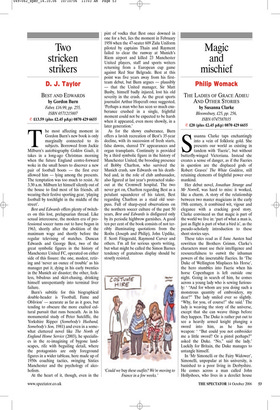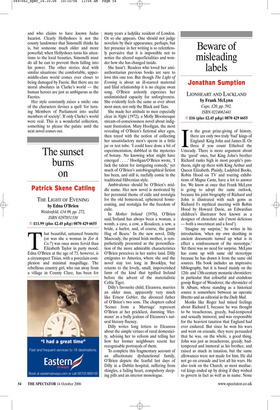Magic and mischief
Philip Womack
THE LADIES OF GRACE ADIEU AND OTHER STORIES by Susanna Clarke Bloomsbury, £25, pp. 256, ISBN 0747587035 ✆ £20 (plus £2.45 p&p) 0870 429 6655 Susanna Clarke taps enchantingly into a vein of folkloric gold. She presents our world as existing in tandem with ‘Faerie’, but without butterfly-winged Victoriana. Instead she creates a sense of danger, as if the Faeries in question are the displaced gods of Robert Graves’ The White Goddess, still retaining elements of frightful power over mankind.
Her debut novel, Jonathan Strange and Mr Norrell, was hard to miss: it worked, like a charm. A story of the relationship between two master magicians in the early 19th century, it combined wit, vigour and elegance with a cracking good story. Clarke convinced us that magic is part of the world we live in: ‘part of what a man is, just as flight is part of what a bird is’, as the pseudo-scholarly introduction to these short stories says.
These tales read as if Jane Austen had rewritten the Brothers Grimm. Clarke’s characters must use their intelligence and resourcefulness to outwit the inhuman powers of the inscrutable Faeries. In ‘The Duke of Wellington Misplaces his Horse’, the hero stumbles into Faerie when his horse Copenhagen is left outside one night. Going in search of him, he comes across a young lady who is sewing furiously: ‘ “And for whom are you doing such a monstrous quantity of embroidery, my dear?” The lady smiled ever so slightly. “Why, for you, of course!” she said.’ The lady is weaving the story of the universe, except that she can weave things before they happen. The Duke is rather put out to see a heavily armed knight plunging a sword into him, as he has no weapon: ‘ “But could you not embroider me a little sword? Or a pistol perhaps?” asked the Duke. “No,” said the lady.’ Luckily for Britain, the Duke manages to untangle himself.
In ‘Mr Simonelli or the Fairy Widower’, Simonelli, unpopular at his university, is banished to a poor living in Derbyshire. He comes across a man called John Hollyshoes, who lives in a derelict house and who claims to have known Judas Iscariot. Clearly Hollyshoes is not the county landowner that Simonelli thinks he is, but someone much older and more powerful; when Hollyshoes turns his attentions to the local beauties, Simonelli must do all he can to prevent them falling into his power. The other stories deal with similar situations: the comfortable, uppermiddle-class world comes ever closer to being damaged by Faerie. But there are no moral absolutes in Clarke’s world — the human heroes are just as ambiguous as the Faeries.
Her style constantly raises a smile: one of the characters devises a spell ‘for turning Members of Parliament into useful members of society’. If only Clarke’s world were real. This is a wonderful collection, something to please the palate until the next novel comes out.



































































































 Previous page
Previous page